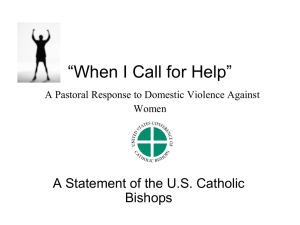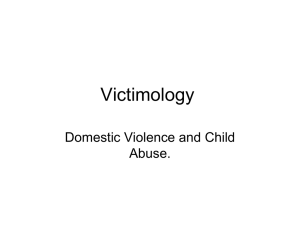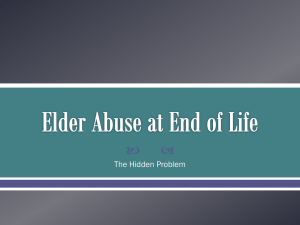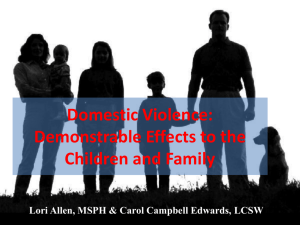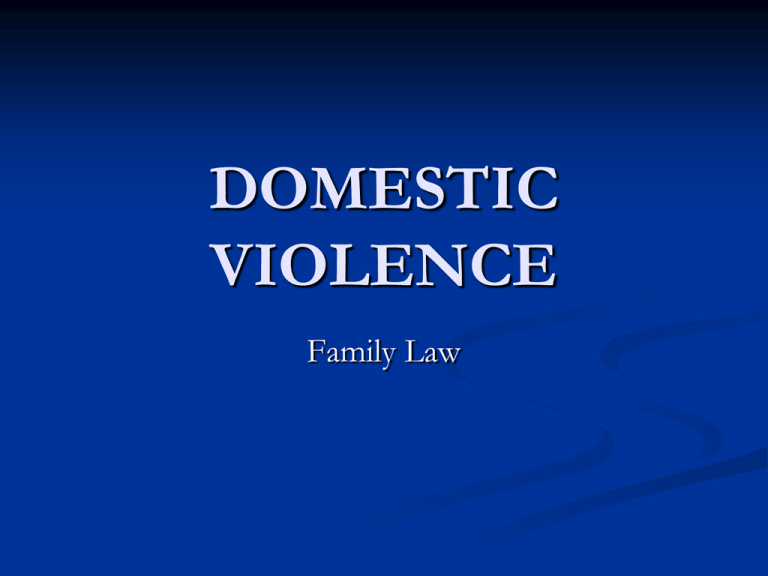
DOMESTIC
VIOLENCE
Family Law
The Violence Against Women Act
(VAWA)
Started
the development of a
nationwide body of laws in 1994 by
providing 1.6 billion toward
investigation and prosecution of
violent crimes against women; and
created the concept of civil redress in
cases that were not criminally
prosecuted.
The California Domestic
Violence Prevention Act
Enacted
in 1993 (AB 1500) and
reorganized in 1994 at the time of the
adoption of the Family Code.
Revised prior language to include
abuse of children within definition of
Domestic Violence (DV); and
eliminated duplicate term definitions in
other codes (CCP, EC, PC, W & I).
DV Has Multiple Statutory
Frameworks
Criminal
Law (Penal Code)
Family/Civil Law (Family Code)
Juvenile Law (Welfare & Institutions
Code)
Domestic Violence
Criminal and Civil
Criminal-Penal Codes
(PC) 273.5, 273.6, 646.9
Civil (Family Law)-FC
6200 et. seq. `
DV Actions require existence of a
Relationship
Both
the Criminal and Civil statutory
schemes require the existence of a
“relationship” between the victim and
the perpetrator, as defined by Family
Code (FC) 6211.
If no relationship under FC 6211, then
will fall under other Crim. or Civil
remedy statutes-not DV.
FC 6211-DV is abuse perpetrated
against any of the following:
(a)
A spouse or former spouse
(b) A cohabitant or former cohabitant
(c) Person perp dated, or is dating
(d)Person with whom perp had child
(e) Child of a Party
(f) Any other person related to the
perp within the second degree of
consanguinity.
No 6211 Relationship?
Now What?
If
facts don’t fall within FC 6211, no
DV. But, will fall under….
Other Crim Statutes (Assault/battery,
trespass, disturbing the peace, etc.);
* Other Civil remedy statutes (Civil
Harassment, Workplace Violence,
Elder Abuse, School Violence).
What is “Abuse”
FC
6203 says that “Abuse” is:
Intentionally or recklessly causing or
attempting bodily injury;
Sexual assault;
Placing a person in reasonable
apprehension of imminent serious
bodily injury to self or another;
Any behavior that could be enjoined
under FC 6320.
What is “Abuse”-cont.
FC
6320 behavior that can be enjoined
Molesting, attacking, striking, stalking,
threatening, sexually assaulting,
battering, harassing, telephoning,
destroying personal property,
contacting either directly or indirectly,
by mail or otherwise, coming within a
specified distance, disturbing the peace
“Abuse”-cont.
Definition
of “Abuse” under FC 6203
is very broad, and does not require
physical injury.
Standard
is not “recent” acts of abuse,
but “past act or acts of abuse”. FC 6300,
6306.
The Usual “Steps” in Domestic
Violence (DV)
Police
at scene request Emergency
Protective Order (EPO) from On
Duty Magistrate-if issued, good for 5
Court days or 7 calendar days,
whichever comes sooner-then expires.
Standard is “reasonable grounds to
believe immediate and present danger
exists.” FC 6250.
DV Steps-cont.
Perp
may or may not have been
arrested. Either way, Prosecutor may
wait to decide re Crim charges. Victim
can seek Temp. Restraining Orders
(TRO) from Family Court under
Domestic Violence Prevention Act
(DVPA) even if Criminal charges are
pursued. Victim can obtain multiple
types of Restraining Orders in DV.
DV Steps-Temporary Restraining
Orders
Good
for 21 to 25 days. Then a
Hearing must be held. FC 242. May be
issued for less, but not more unless
reissued for good cause;
Must grant or deny on same day that
application is made unless too late in
day to permit effective review. FC
6326.
DV Steps-TRO’s
Made
ex parte.
May be issued with or without notice.
FC 6300.
Standard is “reasonable proof of a
past act or acts of abuse”. FC 6300.
Once issued, all DV Orders are
enforceable in every State. FC 6400 et.
seq. (Uniform Interstate Enforcement
of Dom. Viol. Prot. Orders Act).
The Request For Order-DV 100
The
operative Pleading for the TRO
request and the Hearing. It is the
“Complaint”, the allegations of which
the responding party must answer.
MP need not provide home address;
and failure to provide mailing address
does not invalidate orders or
enforcement. FC 6225.
Request For DV Orders-cont.
Name
and descriptive info of person
from whom protection is sought is
required, otherwise, law enforcement
cannot enter the DV Orders into the
CLETS System (California Law
Enforcement Telecommunications
System).
Request For DV Orders-cont.
CLETS
is a statewide system which
allows an individual’s criminal history
to be accessed. All DV Orders,
whether criminal or civil, must, by
federal and state law, be entered into
CLETS. FC 6380(b).
Request For DV Orders-cont.
MP
may request protection for others
without a showing under FC 6211
(relationship) for them if they are:
Family or household members (the
Court will generally only grant
protection if they live with the MP);
Pets
Request For DV Orders-cont.
Relationship
to the Respondent
requires a MP to allege showing under
FC 6211. FC 6205, 6209, and 6210
define “affinity”, “cohabitant”, and
“dating”. “Dating” is defined by the
Code and case law as more than one
date and as “frequent, intimate
associations primarily characterized by
the expectation of affection or sex.”
Request For DV Orders-cont.
Pure
roommates are not covered
under FC 6211.
Any relative outside of the 2nd degree
of Consanguinity is not covered (i.e.:
cousin, aunt, uncle, niece, nephew).
A child’s ex step-parent is not
covered.
M/Party’s Husband/Wife’s ex is not
covered. (Other spouse’s former
Request For DV Orders-cont.
Under
CCP 372(b)(1), a minor over 12
can seek a Protective Order without a
Guardian Ad Litem (GAL) being
appointed. Court has discretion to
appoint once Request For Order is
made, but appointment cannot delay
the proceedings.
Request For DV Orders-cont.
Parties
must inform the Court of other
cases/proceedings affecting custody of
children. FC 6323(a)(1).
Criminal Protective Order will
supersede a Family Law DVPA Order
when the two are in conflict.
If there’s an open Juvenile Court case,
Family Court has no jurisdiction over
the kids; and cannot issue orders.
Request For DV Orders-cont.
If
kids are involved, and there are
Family Law cases pending, or existing
orders in, other counties or states,
there may be a venue or jurisdiction
question which may need to be
resolved under the UCCJEA (Uniform
Child Custody Jurisdiction and
Enforcement Act); and Protection
Orders may need to be issued under
Emergency Jurisdiction. FC 3424.
Request For DV Orders-cont.
Stay Away Orders-more than
100 yards creates Constitutional
issues re travel, etc.
MP often wants stay away for
other peoples’ work, res, cars,
school. Unnecessary if stay away
order re person of MP is issued.
Request For DV Orders-cont.
Move
Out Order is allowed ex parte if:
MP has right to possession under
“color of law”; and
Party to be excluded has assaulted or
threatened MP or MP’s child; and
Physical or emotional abuse will result
if respondent is not removed.
FC 6321.
Request For DV Orders-cont.
Custody,
Visitation and Support
Child Support orders cannot be made
ex parte. FC 6341. Must be requested
in the DV Order Request (DV 100)
and heard at the noticed Hearing.
Custody/visitation orders, if granted
ex parte, must be specific. No orders
can issue if Paternity not previously
established. FC 6323.
Request For DV Orders-cont.
Spousal
Support Orders cannot be
made ex parte. Are heard at the
noticed Hearing if requested in the
moving papers. FC 6341.
Attorneys fees cannot be awarded ex
parte. Request can be heard at the
noticed Hearing if made in the moving
papers. FC 6344.
Request For DV Orders-cont.
Ownership,
possession or access re
firearms and ammunition is prohibited
while a protective Order is in effect
under many State and Federal statutes.
FC 6389, Penal Code 12021. Order is
effective upon issuance of an EPO,
TRO, OAH, or CPO.
Request For DV Orders-cont.
Mutual
DV Orders cannot be issued
unless each Party specifically requests
orders against the other, and the Court
makes findings that both are primary
aggressors and neither acted in self
defense. Monterroso v. Moran (2006)
135 Cal. App. 4th 732.
Request For DV Orders-cont.
Even
if denied, a jurisdictionally
adequate Request for DV Restraining
Orders requires that the Petitioner
receive a Hearing unless the Petitioner
waives that right. Nakamura v Parker
(2007) 156 Cal. App. 4th 327.
21
The DV Hearing
to 25 days after TRO request.
Moving Party (MP) entitled to Hearing
regardless of whether or not TRO
granted, unless Hearing is waived in
writing using Form DV-112. FC
6320.5(b)(c).
Responding Party (RP) entitled to
continuance at 1st Hearing as a matter
of right if notice inadequate. Ross v.
Figueroa (2006) 139 Cal. App. 4th 856.
The DV Hearing-cont.
Full
blown evidentiary hearing. Court
also required to consider: Crim. history
of RP (FC 6306); history of abuse of
child (FC 3011), which can include
written reports, etc.; and history of
abuse by RP upon MP (FC 6300).
The DV Hearing-cont.
To
issue orders, Court must find:
That DV occurred w/n the meaning
of FC 6203 and 6320;
That the MP was the victim;
That the RP was the perpetrator;
That the DV did not occur in self
defense.
The DV Hearing-cont.
Once
DV “Finding” is made, Court
can issue Restraining Orders After
Hearing (OAH) for up to 5 years
initially, renewable by MP if renewal is
requested before expiration of the
initial orders, and reasonable
apprehension of future abuse is
shown. FC 6345; Ritchie v. Konrad
(2004) 115 Cal. App. 4th 1275.
The DV Hearing-cont.
Court
can issue orders made in TRO
and custody, visitation, support,
orders; exclusive use/possession
orders; orders to attend classes
(Batterers Intervention Program (BIP),
Anger Management, Parenting classes);
orders prohibiting consumption of
drugs/alcohol; and orders for drug or
alcohol testing.
Effects of DV “Finding”
Immediately
after a “finding” of DV,
MP and RP are provided copies of the
OAH in Court (unless RP failed to
appear, in which case RP will have to
be served); if RP is present, Review
Hearing is set to ensure enrollment in
BIP and compliance with Orders; and
the OAH are input into the CLETS
system.
Ramifications of DV Finding on
Restrained Party
In
CLETS for years, so when a
prospective employer runs a criminal
history search, even though no
criminal conviction, will show DV
“Finding”;
Presumption of no child custody.
FC 3044.
Ramifications of DV “Finding”cont.
Effectively
(though not statutorily)
prevented from becoming a Doctor,
Lawyer, Police Officer, Firefighter,
Bus Driver, Airline Pilot, Security
Guard, Teacher, Military Officer, etc.
Cannot own/possess any firearm or
ammunition under State DVPA (FC
6389)and Federal VAWA for duration
of OAH.
Ramifications of a DV “Finding”cont.
Exception
to Firearms prohibition
under FC 6389(h) [firearm is a
condition of employment, employer
unable to reassign R/P, firearm only in
R/P possession during work, and
psych eval for peace officer as
prerequisite] is not an exception under
VAWA.
Ramifications of a DV “Finding”cont.
Presumption
that an abusive spouse
shall not be entitled to receive
spousal/partner support from the
victim spouse. FC 4320(i), (m); FC
4325.
No DV Finding
If
the Court makes a finding that no
DV occurred, it has no jurisdiction
under the DV case to issue any orders;
unless the Parties wish to stipulate to
the entry of specific orders.
On Expiration of the OAH
Once
the OAH have expired, if not
renewed, all protective and other
orders contained therein expire; except
for custody, visitation, and support
orders which survive the expiration of
the OAH and remain effective until
expiration by their own terms or
further Court order. FC 6340(a).
Criminal Domestic Violence
(DV)
Can be charged and convicted as
Misdemeanor or Felony
Upon conviction of a crime involving a
victim who fits FC 6211 definition, if
granted probation, Court shall include,
in probation orders, conditions set
forth in PC 1203.097.
Criminal DV
Prosecutorial
Discretion
Requires Beyond Reasonable Doubt
standard of proof
Because of Reas. Doubt Std., requires
demonstrable evidence of abuse
Victims often recant/refuse to testify
Only 15% of all DV cases prosecuted
criminally.
If Criminal Conviction
Unless
a felony, will virtually always
result in Probationary Order.
Probation will include a Criminal
Protective Order (CPO).
Terms of the CPO will always trump
all other DV orders in conflict (Family,
Juvenile, Probate) if they are more
restrictive.
When Probation Granted in Crim
DV Conviction The Court Shall
Impose the Following Terms:
A Criminal Protective
Order
:
Require
notice to the Victim of case
disposition
Impose several $ fines
Order successful completion of a 1 yr.
Batterers Intervention Program.
PC 1203.097
Burdens of Proof
Reasonable Grounds To Believe-EPO
Reasonable Proof-TRO
Preponderance Of The Evidence-OAH
Clear and Convincing-Civil Harassment
Beyond A Reasonable Doubt-Crim-(CPO)
“Domestic Violence” Need Not
Be About “Violence”
As
we’ve discussed, FL Domestic
Violence is defined as “Abuse”, which
has a very broad definition under FC
6203 and 6320.
As such, violence is only a symptom of
what we call “Domestic Violence” as
the Law defines that term; and may
not be present in all DV situations.
DV Not Always About
“Violence”
Virtually
all DV cases break down into
two distinct bases-Anger, and/or
Power/Control. Cases can, and often
do have elements of both dynamics.
Diagnosing a case, based on an
assessment of the facts, is essential to
determining which of these dynamics
is driving the situation.
Power & Control
Often
involves no physical violence;
Perpetrator maintains control over
finances, who victim can see, where
victim can go, who victim can talk to;
Follows/has victim followed, or stalks;
Uses threat of violence, guilt, money as
control methods;
Long pattern/history of this conduct
showing planning/premeditation.
Power & Control-cont.
When
Abuser sees Power/Control
slipping, panics, becomes desperate to
regain control, and may ultimately
resort to violence as last resort.
Appears as a loss of self-control and
may therefore look like event is Anger
based as opposed to Power/Control
based.
Very important to understand Hx.
Anger
Opposite
of Power/Control-not
planned-spur of the moment, visceral
and reactionary; Anger is a loss of
control, not the exercise of control;
Very often accompanied by physical
violence;
Usually situational, although there may
be a history of visceral violent reaction
to various situations.
Why Do Some Victims Abandon
Their Request For DV Orders?
Reasons
for Victim reluctance, refusal
to follow thru after EPO or TRO:
Fear of retaliation
Unwilling to face perpetrator
Shame/guilt
No resources to stay away
Children pressures/fear for their safety
Why Do Some Victims Abandon
Request-cont.
Parental/Cultural
pressures
Denial, withdrawal, emotional mood
swings (trauma symptoms)
Uncertainty of the Judicial process
The Victim’s Reality
Perp
may be:
Living with victim
Familiar with victim’s routine
Has ongoing access to victim
Maintaining power/control thru
various methods
Has children with victim
The Victim’s Reality-cont.
Victim
is often economically
dependent on abuser
Victim may lack employment skills
Is unable to retain counsel
Has no housing other than with abuser
Fears loss of community or family
support
Previous isolation thru power/control
dynamic vitiates outside support now
The Victim’s Reality-cont.
Belief
that the System will not stop
abuse or protect victim because of:
Past abuse, perp statements and
actions, prior attempts at System
solutions.
* Victim’s reality is day to day; they look
for an immediate effect on their safety
and children’s safety.
Victims in Court
Lack
of Confidence in the Court
System
Procedural delay
Complexity
Misinformation
Failure of System response re
violations of Orders
DV as a Tactic
Given
the severe ramifications of a
DV “Finding”, a request for DV
Restraining Orders is sometimes used
as a sword;: i.e. if there is a “Finding”
of DV, there is an automatic
presumption of no custody of
children, no spousal support to R/P,
no firearms (if police or Security
Guard-fatal to employment/career).
Diagnosing The Problem
Is
it DV? A Judge hearing the case
has extremely broad discretion under
the DVPA to determine whether or
not a given fact situation rises to the
level of DV requiring a DV Finding.
Even if the facts fit within the
definition of “Abuse” under FC 6203
and 6320 the situation might not rise
to the level of a DV finding.
Diagnosing the Problem-cont.
Is
this a “situational” DV?
Hx of relationship and ages of the
Parties?
Hx of DV before subject incident?
Any alleged physical abuse? Type?
Perpetrator conduct proactive or
reactive?
Children present?
Diagnosing the Problem-cont.
Victim
deprived of outside contact
during incident (i.e. cell phone taken
away or destroyed; prevented from
contacting police or neighbor or
relative).
Any of the lethality factors present?
DV Lethality Factors in Risk
Assessment
Recent
Separation from abuser
Obsession over victim
Depression/mental illness of abuser
Abuser has extensive Hx of DV or use
of other types of violence
Risks taken by abuser are escalating
Violence perpetrated by abuser is
escalating
DV Lethality Factors-cont.
Victim
is pregnant
Abuser threatens homicide or suicide
Abuser has attempted suicide
Abuser possesses or has access to
weapons
Stalking of victim
Abuser has Hx of sexual violence
Drug/Alcohol issues
DV Lethality Factors-cont.
Abuser
has Hx of rage or anti-social
behavior
Abuser Hx of DV in family of origin
Abuser has Hx of animal cruelty
Abuser is living with children who are
not his own
Abuser is unemployed
DV Lethality Factors-cont.
Hx
of abuser seizing/destroying
victim’s cell phone
Hx of actual or attempted choking
Desperation of Abuser in conduct
Abuser’s conduct demonstrates
absence of recognition of
consequences for actions
Escalation of Abuser Risk Taking
or Abuse Level
In
2005 a Federally funded study
ranked the levels of abuse in order to
determine the levels increased abuse.
Intimate Partner Violence Risk
Assessment Validation Study Final
Report (2005) Drs. Roehl, O’Sullivan,
Webster, and Campbell.
Escalation of Abuse-cont.
Report
risk rank from low to high risk:
Verbal abuse
Psych abuse/harassment (control)
Stalking/Threats
Physical abuse:Low (grab, slap, bruise);
Med (kick, slam to wall); High (choke,
forced sex, serious injury-fx bones);Very
High (weapons, life-threatening injury)
Cycle of Violence-Tension Period
May
last weeks or months;
Stress builds, communication begins to
break down;
Victim senses danger-tries to avoid;
Minor abuse or violent episodes;
Family denies/minimizes as defenses,
blames external factors;
Hopes things will somehow change.
Cycle of Violence-Crisis Period
May
last 2 hours to several days;
Anxiety extremely high;
Major uncontrolled violence occurs;
explosive and unpredictable;
May result in serious injury or death;
Abuser blames victim;
Victim accommodates to survive;
believes escape futile, but may try
temporarily; isolates emotionally.
Cycle of Violence-Calm Period
May
last for days or months;
Family in shock; then glad its over;
Abuser remorseful-seeks forgiveness;
Victim worn down-accepts promises;
Kids now caretakers to keep the peace;
Family welcomes this Stage-believes
will not reoccur-in denial.
Cycle of Violence-Phases of
Physical Abuse
Phase
1 (during Tension Period):
Verbal abuse, hitting, throwing objects,
threats, arguing, blaming;
Phase 2 (during Tension Period):
Pushing, grabbing, restraining;
Phase 3: (during Tension Period):
Slapping, pinching, kicking, hair
pulling;
Cycle of Violence-Phases of
Physical Abuse-cont.
Phase
4 (during Crisis Period): Hitting,
choking, beating objects, sexual assault
or sex by intimidation, may involve use
or threat of use of weapons, property
damage, unbridled use of force;
Phase 5 (during Calm Period): Denies
and rationalizes violence; apologizes
and promises not to repeat.
Cycle of Violence-Phases of
Physical Abuse-cont.
Phase
5-cont.: Sobriety or Counseling
Syndromes
Where drugs/alcohol involveddrinking caused the problem-Perp will
never drink again; and/or
Promises to go to counseling and
violence will never happen again.
[Statistics show 1% go voluntarily]
3 Types of Batterers
Not
to be confused with “Bases of
Abuse” (i.e. Power/Control vs. Anger)
Antisocial Batterer (20%)
• Severe/escalating phys., sexual &
emotional abuse of partner;
• No remorse, blames others, will not
accept responsibility;
• Power/Control severe & obvious;
• Likely abused as a child;
3 Types of Batterers-cont.
Antisocial
•
•
•
•
•
•
•
Batterer-cont.
Doesn’t learn to tolerate others;
Dismisses attachments/relationships;
Substance abuse probable;
Hx of violence & volatile relationships;
Conservative sex role attitudes;
High probability of arrest record;
Less amenable to treatment/therapy.
3 Types of Batterers-cont.
The
•
•
•
•
•
•
“Ordinary” Batterer (50%)
Prior arrests and treatment less likely;
Severity of psych or sexual abuse to
victim less;
Less likely to have been abused as a
child;
More middle class;
Least likely to abuse own children;
More liberal attitudes towards women.
3 Types of Batterers-cont.
The
•
•
•
•
•
“Enmeshed” Batterer
Little physical abuse to partner, no
physical child abuse;
Dependent on the relationship-can’t
live w/o him/her;
Dangerous when partner leavesseparation rage/terror;
Sometimes involves substance abuse;
Depression/Suicide threats or ideation
Characteristics of Battered
Women
Low
self esteem; suffers guilt;
Traditional sex role stereotypes; uses
sex to establish intimacy;
Dependent economically and/or
emotionally;
Socially isolated;
Believes DV Myths-expects and
accepts responsibility for abuse
Characteristics of Battered
Women-cont.
Believes
that no one can help her
resolve situation;
Fears change, but hopes for change;
Accepts fate/situation to protect
children
Effects of DV on Victim
Post
Traumatic Stress Symptoms
(PTS): trouble sleeping, flashbacks,
disassociation; avoidance of stimuli
associated with the event;
hypervigilance; self medication thru
substance abuse; stress related physical
symptoms; skewed view of abuser;
Effects of DV on Victim-cont.
PTS
Symptoms-cont.
Impaired relationships with others;
impaired value system-meanings of love,
commitment and safety are skewed;
increased thoughts of suicide; impaired
short and long term memory;
depression, anxiety, irritability.
A
Effects of DV on Children
Child’s observation of abuse against
a parent is considered abuse of the
Child under the DVPA. FC 3011.
In those cases in which the parents
claimed that the child never heard DV
(arguing, phys. abuse, threats) those
children (now adults in the study)
reported in 85% of the cases reviewed
that they knew what was happening.
Univ’s of Texas and Ariz. (2008)
Effects of DV on Children
[U.S. Dept. Health]
High
rate of internalization:
depression, anxiety, social withdrawal;
Lower self-esteem and self-efficacy;
Low social competence-fewer interests
or social activities;
Higher rate of externalizing behavior
(acting out)-aggressiveness,
hyperactivity, anger mngmt problems;
Effects of DV on Children-cont.
Irritability,
agitation, trouble
concentrating, exaggerated/startled
responses;
Truancy, poor grades, suspensions,
expulsions, behavioral problems;
Physical problems-asthma, muscle and
stomach problems;
Effects of DV on Children-cont.
Higher
propensity for violent
behavior;
Greater incidences of suicide attempts;
Greater likelihood of committing
sexual assault crimes; abusing drugs or
alcohol;
Regressive behavior-bedwetting,
thumb sucking;
Guilt, fear, confusion, depression.
DV Myths
* 90-95% of DV is Men against
Women
Fact: Nat’l Institute of Justice, DOJ,
and CDC estimates 1.5 million women
and 835,000 men are DV victims each
year.
Men were DV victims 38% of the time
per major U.S., Canada and Great
Britain studies.
DV Myths-cont.
* In some States, Men have a right to
discipline their partners for
misbehaving; and Battering is not a
crime.
Fact: DV is a crime in every State in
the U.S.
DV Myths-cont.
* DV by Women against Men is not
serious.
Fact: Per the DOJ/CDC National
Violence Against Women 2000 survey,
10.8% of women vs. 4.1% of men
used a knife on their victim.
21.6% of male victims were threatened
with a knife; 12.7% of women victims
were threatened with a knife.
DV Myths-cont.
* Almost all of physical/violent DV
by Women is in self-defense.
Fact: DOJ/CDC survey of 1,000
women showed 20% had initiated the
violence.
Of those, reason for the violence:
44% wanted to gain Partner’s attention;
43% felt Partner not listening; 38% felt
Partner verbally abusive.
Warning Signs of an Abuser
Pushes
for exclusive commitment
immediately;
Excessively jealous/possessive;
Controlling-interrogates intensely;
Unrealistic expectations –expects
perfect Partner to meet every need;
Isolates-may deprive of a phone or car;
Blames others for problems/mistakes;
Cruel to animals and/or children;
Warning Signs of an Abuser-cont.
Others
are responsible for Abuser’s
feelings (“You make me angry” vs. “I
am angry”);
Easily insulted (claims “hurt” when
really “mad”);
Use of force during sex:
Degrades, criticizes;
Rigid view of gender roles;
Warning Signs of an Abuser-cont.
Threatens
violence, then dismisses
threat as not meaning it or “everyone
talks like that”;
Sudden mood swings;
Admits prior DV but insists not their
fault.
Why Victims Stay
Economic
dependence;
For the children-need other parent;
Family Pressure to stay together;
Fear of being alone;
Loyalty-this is a sickness, “I’d stay if
he had cancer wouldn’t I”;
Feels sorry for Abuser-bad childhood;
Rescue complex-Abuser can be saved;
Why Victims Stay-cont.
Fear
Abuser will commit suicide;
Denial-”He/She is not so bad”;
Love-very loving when not abusive;
Duty-’till death do us part;
Guilt-victim is the cause of problems;
Responsibility-up to victim to work
things out;
Shame/Humiliation/Embarrassment
Why Victims Stay-cont.
Security-believes
that they can live
“happily ever after”;
Identity-needs Partner to be complete;
For Protection of children;
Afraid-threat to kill if victim leaves;
Low Self Esteem-Will never find
anyone better;
Gender conditioned-that’s how they
are.
The FC 3044 Presumption
Rebuttable
Presumption that upon DV
Finding, award of sole or joint physical
or legal custody of a child to the
perpetrator is detrimental to the best
interests of the Child under FC 3011.
Presumption may only be rebutted by
a preponderance of the evidence.
FC 3044 (a).
FC 3044 Presumption-cont.
Applies
to someone who has been
found to have “perpetrated domestic
violence” defined as having been
found by the Court to have
intentionally or recklessly caused, or
attempted to cause: bodily inj, sex
assault, victim in reas. apprehension of
imminent serious bodily injury to
victim or another, threatening,
harassing, striking, disturbing the peace
FC 3044 Presumption-cont.
Applies
when “Finding” of DV has
occurred within the last 5 years that
Party seeking custody has committed a
DV crime against another falling under
FC 6211, or has committed DV under
the DVPA . FC 3044(d).
If Presumption not rebutted, sole
physical and legal custody must be
awarded to other parent.
The 3044 Presumption-cont.
In
determining whether Presumption
is rebutted, Court shall consider:
Child’s best interests [but frequent
and continuing contact preference
under FC 3040 may not be used to
rebut];
Perp successful completion of BIP,
Parenting Class, Drug/Alcohol
3044 Presumption Rebuttal-cont.
Complied
w/probation/parole terms;
Complied w/ROAH terms;
Committed any further DV acts;
FC 3044 (b).
But best interests of the Child is always
the ultimate default standard, as defined
by FC 3011.

